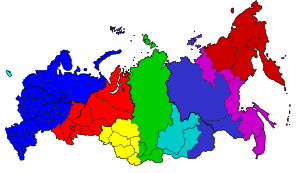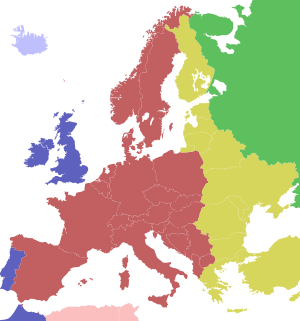- Moscow Time
-
 Time in Russia
Time in Russia
UTC+03:00 MSK−1: Kaliningrad Time UTC+04:00 MSK: Moscow Time UTC+06:00 MSK+2: Yekaterinburg Time UTC+07:00 MSK+3: Omsk Time UTC+08:00 MSK+4: Krasnoyarsk Time UTC+09:00 MSK+5: Irkutsk Time UTC+10:00 MSK+6: Yakutsk Time UTC+11:00 MSK+7: Vladivostok Time UTC+12:00 MSK+8: Magadan Time  Time zones of Europe:
Time zones of Europe:
Light colours indicate countries that do not observe summer time: Algeria, Belarus, Iceland, Russia, Tunisia.blue Western European Time (UTC+0)
Western European Summer Time (UTC+01:00)light blue Western European Time (UTC+0) red Central European Time (UTC+01:00)
Central European Summer Time (UTC+02:00)yellow Eastern European Time (UTC+02:00)
Eastern European Summer Time (UTC+03:00)orange Further-eastern European Time (UTC+03:00) light green Moscow Time (UTC+04:00) Moscow Time (Russian: Моско́вское вре́мя) is the time zone for the city of Moscow, Russia and most of western Russia, including Saint Petersburg. It is the second westernmost of the nine time zones of Russia. Moscow Time has been UTC+4 year-round since 27 March 2011.[1]
Moscow Time is used to schedule trains, ships, etc. throughout the Russian Federation, while airplane travel is scheduled using local time. Times in Russia are often announced throughout the country on radio stations as Moscow Time, and this time is also registered in telegrams, etc. Description of time zones in Russia are often based on Moscow Time rather than UTC. For example, Yakutsk (UTC+10) is said to be MSK+6 within Russia.
Contents
History
In accordance with the 16 June 1930 Decree of the Council of People's Commissars, the Decree Time was introduced by adding one hour to the time in each time zone of the USSR, so that Moscow Time became three hours ahead of Coordinated Universal Time.[citation needed]
Until 2011, during the winter, between the last Sunday of October and the last Sunday of March, Moscow Standard Time (MSK, МСК) was 3 hours ahead of UTC, or UTC+3; during the summer, Moscow Time shifted forward an additional hour ahead of Moscow Standard Time to become Moscow Summer Time (MSD), making it UTC+4.
In 2011, the Russian government proclaimed that daylight saving time would in future be observed all year round, thus effectively displacing standard time—an action which the government claimed emerged from health concerns attributed to the annual shift back-and-forth between standard time and daylight saving time.[1] On 27 March 2011, Muscovites set their clocks forward for a final time, effectively observing MSD, or UTC+4, permanently.
Usage
The section of European Russia (the portion of Russia west of the Ural Mountains), which contains the city of Moscow, uses Moscow Time. In Kaliningrad Oblast, UTC+3 is used.
Past usage
Prior to 27 March 2011, Moscow Time was UTC+3. Daylight saving time was used in the summer, advancing it to UTC+4.
UTC+3 was also formerly used in European parts of what was then the USSR:
- Belarus, in 1930–1991
- Estonia, in 1940–1989
- Latvia, in 1940–1989
- Lithuania, in 1940–1989
- Moldova, in 1940–1991
- Ukraine, in 1930–1990
- Kaliningrad Oblast (Russia), in 1946–1991
- Samara Oblast (Russia), in 1989–1991, and again from 2010–2011.
Moscow Summer Time (UTC+4), was first applied in 1981 and was used:
- until 1988 in Estonia, Latvia, Lithuania
- until 1989 in Belarus, Moldova and Ukraine
- until 1990 in Kaliningrad Oblast.
- between 1989 and 1990 and in 2010 in Samara Oblast.
In 1922–30 and 1991–92, Moscow observed EET (UTC+2). Daylight saving time (UTC+3) was observed in the summer of 1991, and the city and region reverted back to UTC+3 by the summer of 1992.
Notes
- ^ a b "Russia Abolishes Winter Time". Timeanddate.com. 2011-02-08. http://www.timeanddate.com/news/time/russia-winter-time.html. Retrieved 2011-03-26.
External links
Categories:- Time zones
- Time in Russia
Wikimedia Foundation. 2010.
